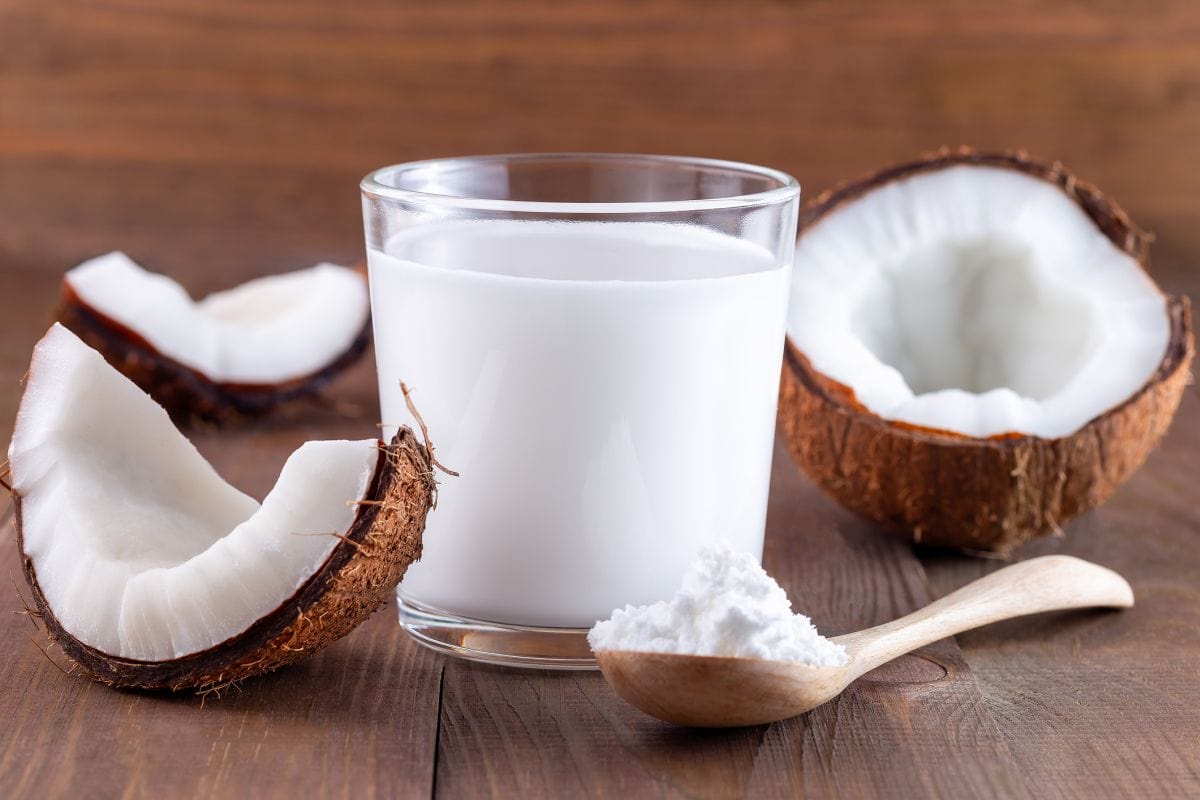Coconut milk is a dairy-free alternative to regular milk that is made from coconut meat and water. It has a creamy texture and light coconut flavor and can be used in both sweet and savory dishes. Coconut milk doesn't provide as much nutrition as cow's milk, but you can still enjoy it in moderation.

What Is Coconut Milk?
Coconut milk is a plant-based, dairy-free alternative to cow's milk. Coconuts have a hard, brown shell with edible flesh inside. To make coconut milk, the soft flesh is grated, soaked in water, then squeezed through cheesecloth to extract the liquid.
The popularity of coconut milk has been growing in recent years because it is seen as a healthier alternative to dairy milk for people who are lactose intolerant or allergic to soy. You can buy coconut milk in the refrigerated dairy section in a carton. You can even make coconut milk yourself at home.
Canned coconut milk is much higher in calories and fat and lower in nutrients, so it is not the best option as a dairy milk drink substitute.
Coconut Milk Nutrition
The following nutrition information is for fortified unsweetened coconut milk in a carton. Canned coconut milk usually has many more calories and grams of fat and fewer nutrients. Always read the nutrition label for any product that you are buying.
- Coconut milk calories
One cup of unsweetened coconut milk has 46 calories. This is less than half the calories in low-fat (1%) cow milk.
- Coconut milk protein
Coconut milk does not have any protein while low-fat cow milk has 8 grams of protein in one cup. So coconut milk cannot replace cow's milk as a good protein source.
- Coconut milk fat
One cup of coconut milk has 4 grams of fat, and most of that fat is saturated fat (3.5 grams). Saturated fats are bad for your health because they can increase your risk of heart disease and stroke. These fats can raise the levels of cholesterol in your blood, which puts you at a greater risk of developing cardiovascular problems.
- Coconut milk cholesterol
Coconut milk does not have cholesterol in it, but the high level of saturated fats may increase the cholesterol in your blood.
- Other nutrients
Fortified unsweetened coconut milk in the carton is high in vitamin D and vitamin B12. And while it is fortified with calcium (130 mg per cup), it doesn't have as much calcium as cow's milk (307 mg per cup) and some other fortified plant-based milks.
Coconut Milk FAQs
Drinking unsweetened coconut milk from a carton is good for you in moderation. It is low in calories and fortified with some vitamins and minerals. But it doesn't have protein and has a moderate amount of saturated fat. Canned coconut milk is not a good choice for drinking or using in large amounts because of its high calorie and fat content.
Fortified coconut milk in the carton contains some calcium but not as much as cow's milk. Read the nutrition label to see how much calcium the product has before you buy it.
Yes, coconut milk is made from coconut flesh and water. So it does not have any lactose or dairy in it.
Yes, coconut milk is made from coconut flesh and water. So it does not have any lactose or dairy in it.
Bottom Line
If you are looking for a plant-based, dairy-free alternative to cow's milk, coconut milk is one option. It is low in calories but doesn't have any protein. It is fortified with some essential nutrients, but it contains saturated fat.
When choosing coconut milk, make sure to look at the nutrition label to find a brand that is unsweetened, lower in calories and fat, and fortified with calcium and other key nutrients. Whether you use coconut milk in your smoothies or coffee or drink a cup with breakfast, this versatile ingredient can be a healthy addition to your diet in moderation.


